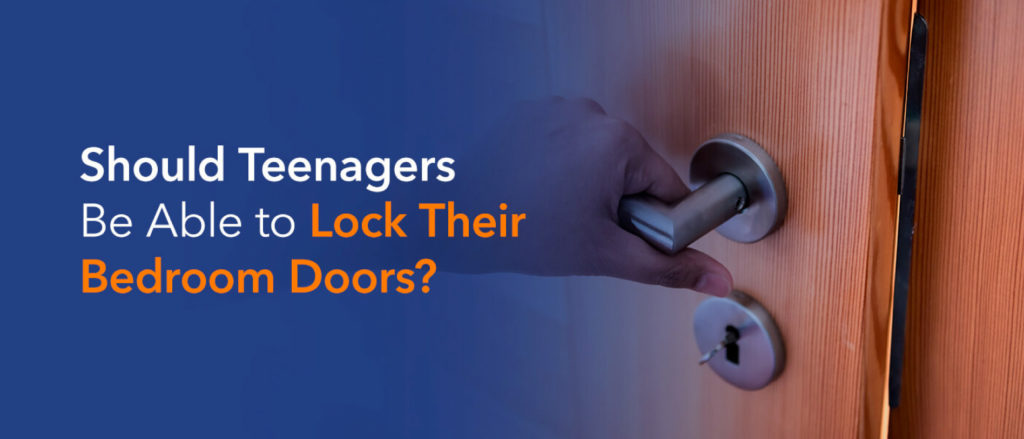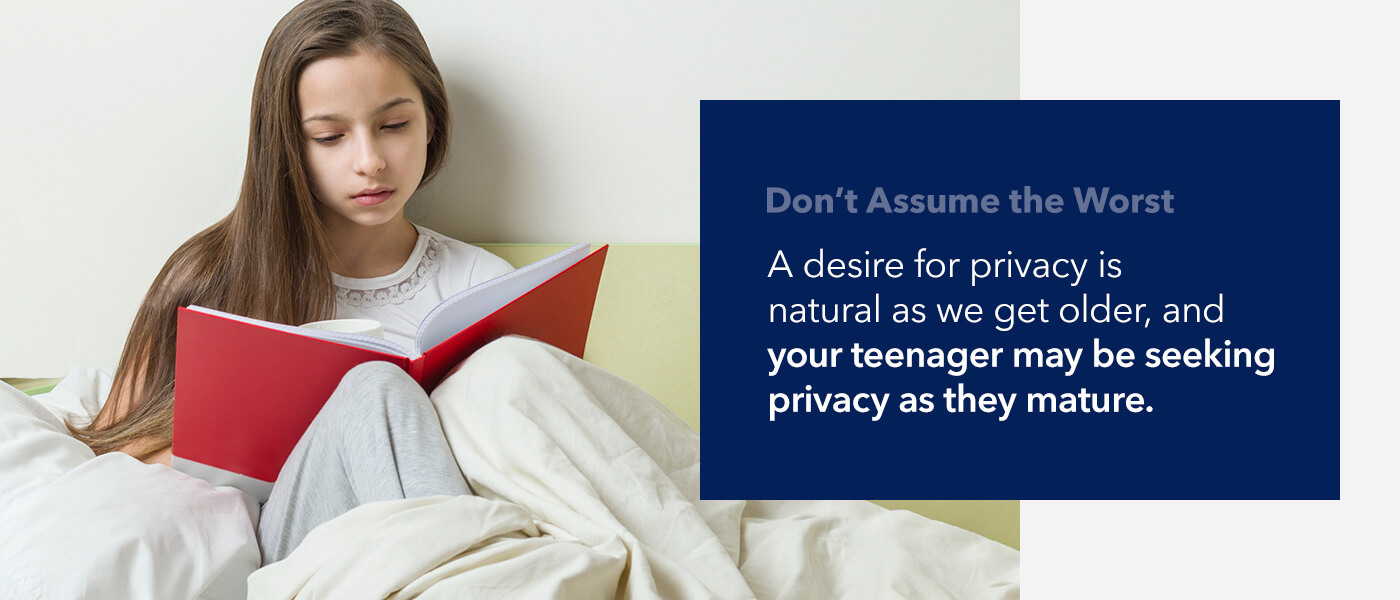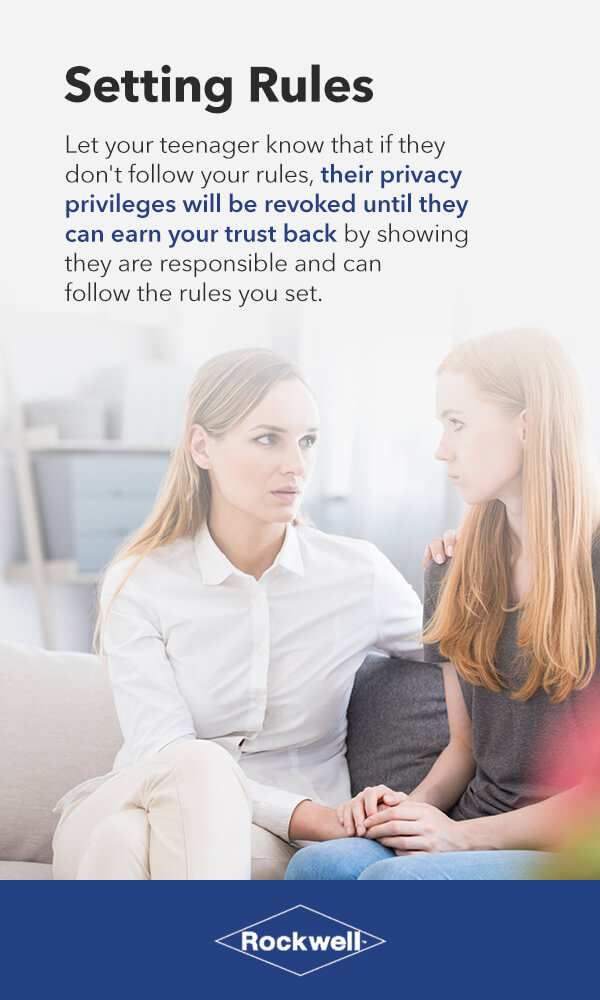Should Teenagers Be Able To Lock Their Bedroom Doors?
07/28/2021, 1:50 PM

When your child enters their teenage years, they’re likely to want more privacy. Maybe they start closing their door during the day or at night when they go to bed. Maybe this means they start locking their bedroom door, and when you try to enter their room to clean or bring them their laundry, you suddenly find yourself facing a locked door for the first time.
At some point, this is a concern that you may face as a parent and a discussion that your family may need to have. Should your teenager be allowed to lock their bedroom door? Ultimately, only you can decide what’s right for your kids and your family, but this guide can help you choose.

Don’t Assume the Worst
While you may be startled when you face a locked bedroom door for the first time, avoid assuming the worst. A desire for privacy is natural as we get older, and your teenager may be seeking privacy as they mature. This isn’t necessarily a sign that your child is doing anything they shouldn’t be like sneaking out or drinking.
A good rule of thumb is to avoid invading your teenager’s privacy unless there are warning signs. While you should know what your kids are doing and have online restrictions in place, the most crucial step is talking to your kids about the dangers that are out there and trusting them with the freedom to make the right decisions.
Teenagers aren’t likely to be open with you at all times or share all of their activities and thoughts. But the honest conversations you have had with your child and the tools you have given them will help them navigate their everyday choices as they become more independent.
Your teenager needs to know you respect them and their desire for some privacy. This degree of privacy can help your child become more independent and build self-confidence. Of course, you also need to be able to trust your child. If you have reasons not to trust your teen with more privacy, a door lock may not be the right option for your family.
However, if your child hasn’t given you any reasons not to trust them, you may want to consider giving them this added degree of privacy. Though not always the case, many teenagers who have a history of making good decisions are less likely to engage in dangerous or risky behavior.
Respecting Your Teenager’s Privacy
For teenagers, privacy is a must. During their teen years, your child is selecting traits that help them build their identity, trying out different aspects of their personality and testing ways to participate in social situations and the culture. Many teenagers use the privacy of their own bedrooms as a safe space for experimenting.
When Should You Allow Your Teenager to Close Their Bedroom Door?
You may decide that the best decision for your family is to allow your teenager the chance to experience being alone with themselves. Many parents choose to allow their teenagers to close their bedroom doors while alone or with siblings or friends. Depending on your teen’s sexuality, you may choose to make an exception for friends of the opposite sex. This is a decision that only you can make and will depend on how trustworthy your child is, along with how much you trust their friends.
What Should You Do If Your Teenager Engages in Unacceptable Behaviors?

Privacy privileges may be revoked temporarily if you discover that your child is engaging in behaviors you don’t approve of in their room, such as drinking alcohol. With privacy comes responsibility, and you need to be able to trust your teen with both, so you may want to revoke privacy privileges until the trust is reestablished.
If you notice warning signs, you may want to start a discussion with your child. Warning signs may include:
- Your teenager’s grades have been dropping.
- Your teenager has been withdrawing emotionally.
- Your teenager has suddenly been having trouble sleeping.
- Your teenager has been getting in trouble in school or at home.
- Your teenager has been hiding things, like a vape in their pocket.
Additionally, if you overhear your teen talking with a friend about dating violence or you see them crying over a social media post, it may be time to reassess their privacy privileges and talk with them. Ultimately, keeping your kids safe is more important than their privacy, and these red flags may signal that something harmful is occurring.
While you can’t expect your teenager to tell you everything, you should maintain an open dialogue that allows you to get to know your teen, gives your teen the chance to discuss their problems and ideas and establishes a strong bond between the two of you based on understanding and love. This can ensure you and your teenager can remain close while they enjoy privacy privileges in your home.
In Case of Emergency
In an emergency, you need to be able to get in the room and your teen needs to be able to get out. As such, some parents may be concerned about allowing a lock on their child’s door. If the door is locked, you may not be able to get in or your child may not be able to get out.
While a lock can be used safely if desired, for safety reasons, you may not want to have a lock that requires a key. The only residential doors that should require a key are entry doors that lead outdoors.
For example, if there’s a fire, a locked door may prevent help from getting to your child, especially if the lock requires a key. If you cannot find the key or your child is incapacitated in the room, the only option is breaking the door down, which is very challenging. In an emergency like a fire, when every second counts, a lock with a key may prove disastrous.
When you have younger children, a locked door can be a greater safety issue. However, when your child becomes a teenager, this may not be as significant of a concern. If you have young children, you may want to install door handles without locks. You may want to revisit this as your kids get older, especially if your teenager expresses a desire for a lock.
A Potential Compromise
If your teenager desires more privacy, but you are concerned about the risks that a locked bedroom door could pose to their safety, you may want to discuss potential compromises.
Boundaries Against Intrusion
One of your teenager’s reasons for wanting a lock is to establish boundaries against intrusion, including by you. Fortunately, you can establish boundaries without the need for a lock. When you want to enter your teenager’s room, knock on the door, ask to come in and wait for an invitation before entering the room.
Even if you knock, entering the room while knocking isn’t much better than entering without warning. No one likes an intrusion like this, so extend to your teenager the same courtesy you want others to give you by knocking and waiting for a response.
Your teenager is a budding adult who deserves both physical and emotional privacy. If you observe the knocking rule at all times, your teenager may feel no need for a lock on their door.
Other Privacy Privileges
You may also be able to satisfy your child’s desire for more privacy by awarding other privacy privileges. First, determine what information you need to know and what information you don’t. For example, while you need to know where your teenager will be going, when they will be home and who they will be with, you don’t need to know everything they discuss with their friends.
While some teenagers are happy to openly discuss the details of their time spent with friends, some teenagers aren’t willing to share many details. This isn’t cause for alarm, and demanding more information may alienate your child. Once you have determined the information you need to know and what you can allow your child to keep private, you can begin figuring out the additional ways you can give your teenager more privacy, such as:
- Permitting your teenager to have alone time.
- Leaving your teenager’s notebooks and journals alone.
- Asking if you can get something out of your teenager’s backpack or wallet.
- Letting your teenager see their doctor privately if this is what they prefer.
- Leaving your teenager’s phone alone rather than snooping through their emails and texts.
- Allowing your teenager to have private conversations with siblings or friends without demanding details.
If you’re unsure how much privacy to award, you may want to assess how responsible your teenager is with their obligations. Do they complete homework on time? Do they arrive on time for school, work, appointments and their curfew? Do they do their chores? If your teenager has demonstrated that they are responsible, you may want to give them a little more of the privacy they have earned by gaining your trust.
A Privacy Lock
If you do decide to install a lock on your teenager’s bedroom door, you may want to choose a privacy lock. This is a type of lock that does not require a key and offers a way to open the door from the outside with little effort, affording your child the privacy they desire while also ensuring the room is accessible and escapable in an emergency.
Whatever Is Right for Your Family
No one can tell you how to raise your teenager. Ultimately, you should discuss the issue of a lock with your teenager to decide what is the best fit for your family.
Knowing Your Teenager
You know your child best, but it can help to actively observe their behavior to determine whether a lock may be appropriate for them. How have they matured in the past few years or months? Have they been responsible, meeting their obligations at home and at school? Have they been in serious trouble in the past, such as by sneaking out, drinking or getting suspended?
If your teenager has a record for being responsible and making good decisions, a lock may be an option worth considering. If your teenager has struggled in the past with decision-making but has been showing significant improvement, you may also want to consider giving them this additional privacy measure.
Keep in mind that every child is a work-in-progress and you will need to monitor their behavior, especially if you choose to award more privacy with a lock.
Setting Rules
If you choose to allow your teenager to have a lock on their bedroom door, you may want to discuss the rules and your expectations.
For example, while you may permit your teenager to lock their door when they are alone in their room during the day, you may determine that it is not safe for them to lock their door at night and that they should not be allowed to lock their door when they have friends over.
Let your teenager know that if they don’t follow these rules, their privacy privileges will be revoked until they can earn your trust back by showing they are responsible and can follow the rules you set. Explain that these rules are intended to keep them safe and are not being implemented as a punishment or because you don’t trust them.
Letting Your Teenager Earn a Lock
Further, you may want to give your teenager the opportunity to earn a lock on their door. If your child has expressed a desire for a lock, talk to them about why they want a lock. If you believe that a lock may be appropriate for your teenager, offer a few ways they can earn this privacy privilege.
For example, if they keep their grades up, stick to their curfew and successfully take on another household chore, such as doing their own laundry, you will install a lock on their door.

Browse Our Locks at Premium Hardware
At Premium Hardware, we are a leading manufacturer of residential door hardware. Based in Northern California, we focus on meeting and exceeding our customers’ expectations, and we believe style and safety go hand in hand. Door hardware plays a key role in your home’s decor and security, and we can provide you with products that withstand the test of time.
For decades, our innovative products have featured advanced design elements, quality craftsmanship and durable materials, all accompanied by unmatched customer service. If you would like a door with a lock on it, you can visit our website to browse our product catalog of various door locks.
